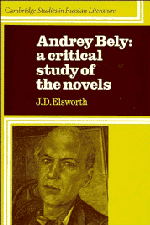Summary
The idea of writing a trilogy of novels remained with Bely after the completion of Petersburg. There is a sense in which The Silver Dove and Petersburg can be regarded as thesis and antithesis, the former novel concentrating on ‘the dark abyss of the East’, and the latter upon the most traditional symbol of Russia's westernization. Yet already in Petersburg these opposites were seen to be ultimately indistinguishable from each other, and the same line of thought is pursued in much of Bely's theoretical writing. That does not, however, mean that they are synthesized. Such a synthesis was the dream of Sergey Musatov, and of Dar′yal′sky himself, and, expressed in somewhat different terminology, was the main burden of Bely's ideas about Symbolism. Clearly it is because of their separateness that they are identical in their destructive qualities and the culture built upon them is consigned to extinction. They will be synthesized only by a new cultural beginning, and that is what Bely believed he had found in anthroposophy.
The self-conscious narrator of Petersburg had created a situation in which it was impossible to tell whether the narrated action was supposed to be taking place in some replica of the real world or solely in the mind of the novel's author. That state of affairs may rightly be regarded as part of the ironic nature of that novel, but it corresponds also, and more fundamentally, to an element in Bely's perception that was confirmed and systematized by his introduction to anthroposophy.
- Type
- Chapter
- Information
- Audrey BelyA Critical Study of the Novels, pp. 117 - 137Publisher: Cambridge University PressPrint publication year: 1983



